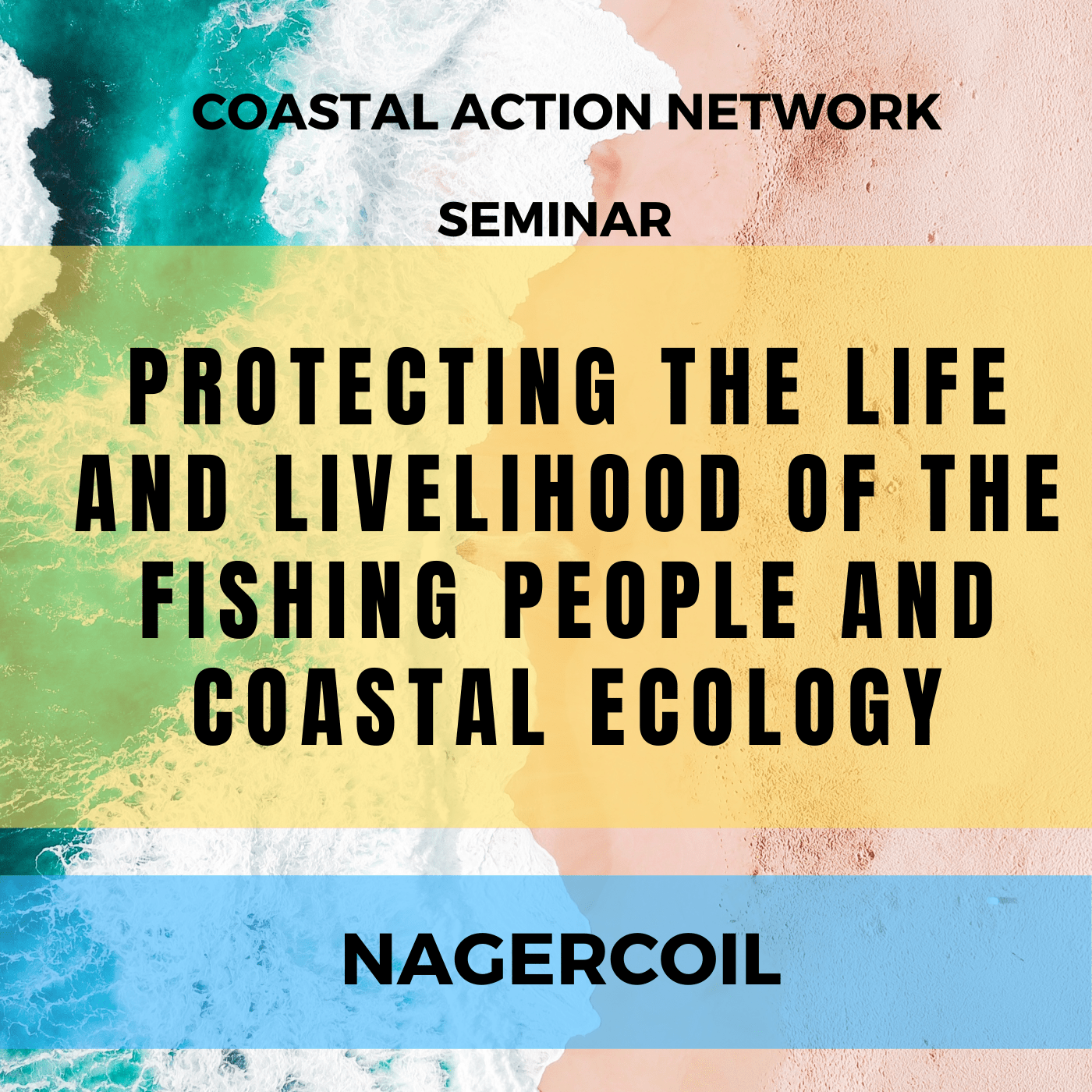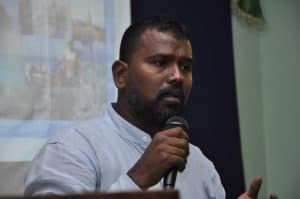Two day Seminar on Protecting the Life and Livelihood of the Fishing People and Coastal Ecology (including implication of Coastal Regulation Zone Notification2011 and the Importance of Environment Impact Assessment Notification (EIA) 2006) at oastal organised by Coastal Action Network today, several eminent speakers who addressed the seminar called for the Protection of Sand Dune, as very essential for the regeneration of Coastal Ecology and sustenance of the habitat and livelihood of fishing people another coastal poor.
Coastal sand mining, they said for garnet minerals monocyte and other minerals was rampant and illegal along the coastal belt of Kanyakumari, Tuticorin and Tirunelveli causing severe damage to seashore fishing, fisheries and coastal ecology.
The speakers also called for repealing of Coastal Regulation Zone Notification 2011 as it permits several industries that were prohibited under Coastal Regulation Zone Notification 1991. This Notification fails to protect land and livelihood of the fishing people and the urgent need was to restore CRZ Notification 1991 by withdrawing all the amendments that diluted 1991 Notification.
Around 110 participants including several fishing leaders, women fish vendors and workers participated in the two day seminar. At the conclusion the participants took a pledge that in each village there will be at least two defenders to protect the coast and coastal ecology.
Numerous fishing habitats and their homelands are facing extinction due to Government policy and changes in laws. The establishment of destructive development mega projects like industries, thermal power project, nuclear stations, hazardous,etc., have resulted in thousands of fishing people and other coastal poor being displace from their homeland leading to extreme vulnerability of these communities especially women  and children.
and children.
Fishing women workers / vendors lose their access to jobs and marketing of fish. Children are uprooted from their safe surroundings and schools and friends and often forced to join the labour market. Women and children with no social security and community protection are victims of violence and sexual abuse.
Privatisation of coastal resources for construction of industrial projects, aquaculture shrimp industries, hotels, tourist resorts, entertainment parks, power projects; leads to loss of local food security as production is increasingly geared towards export. The appropriation of coastal common lands under the guise of industrial agreements; loss of bio-diversity due to industrialisation and industrial fishing, destruction of habitats, dumping of industrial wastes, increasing public finance for practice of mono specie production, intensive aquaculture, are some of the impacts of the state’s policies on the coast, which destroyed a long heritage of sand dunes and coastal vegetation as protection barriers to several floods that used to hit the coast including tidal waves. Commercial ports and harbours generally requires large areas of land, always has a major impact on the natural landscape.
Among the coastal environments, sand dunes occupy a very important role. The sands found in the rivers are mined for construction purposes. Despite there is law to control and prevent illegal sand mining. Certain amount of sand in the river beds is required because the sand deposits in the river beds are capable of holding water and thus enhance ground water table. Most of the river beds are dredged out. Environment and the coastal sand dunes are in danger.
In certain places due to the global effect more sand is deposited in the shores which results in the formation of sand dunes. Today the formation of new sand dunes is very rare. This is mainly due to the human activities like construction of groynes, laying of huge stones for fishing etc. This has resulted in restricting the Sand Dynamics. The importance and the need for the conservation of the sand dunes thus created are very essential. Understanding of the sand dune ecosystem and its biodiversity will be of immense benefits.
Sand dunes protect the coastal villages from natural disasters like tsunami and cyclones. When the natural disasters like tsunami or cyclone occur, if sand dunes are available there they restrict the speed and force of such disasters and thus prevent them from destroying the human habitats. When sand dunes are destroyed or used for other purposes means we are inviting or creating danger to human life and property.
A committee of the Coastal Defenders Coastal villages Kanniyakumari district was formed for protecting the coastal lands, eco system and their livelihood resources. These committees would document the existing violations as per CRZ 1991 and monitor all future violations.
The participants adopted the following demands:
Repeal Coastal Regulation Zone Notification 2011
The Coastal Regulation Zone 2011 is another attempt to legalise all the violations. In the name of strengthening CRZ Notification 1991, this attempts to remove all the protection ensure to the fishing and coastal communities to have their livelihood rights. Hence this amendment 2011 needs to be reviewed and withdrawn.
Ensure the rights of women fish workers and vendors
The state should work with the central government to make necessary constitutional amendments to ensure reservation for fishing community in the Panchayat government, legislative assembly and parliament. The state should stop evicting the coastal community in the name of permitting destructive development projects and tsunami reconstruction plan.
The state and the central government should immediately make necessary legal intervention to confer the status of workers to the women fish workers and bring a comprehensive policy for the empowerment of the women fish workers at all levels
Stop Special Economic Zones (SEZ) and repeal the Tamil Nadu Industries Act
In the name of special economic zones nearly 37,000 TNCs have entered the Indian market. Out of them, nearly, 200 companies are more powerful in terms of capital and technology. Nokia, Microsoft, Pepsi, cocoa cola Sony, Samsung general motors Honda, Hero Honda are some of the companies. The SEZ do not require public hearings or EIA and need not follow any environmental standards, No labour laws are applicable. But to set up SEZs in the coast they need clearance from the MOEF. But the following industries are exempted from the requirement of environmental clearances. As a strategy deployed to evict the fishing community, tourist resorts, entertainment parks /Theme parks, golf grounds, IT sectors and desalination plants are some of such industries.
Ban Coal Fired Thermal Power Plants
Key Livelihood Impact such as Loss of access to grazing land, coastal forestry, Loss of habitats, denial of approach roads, common pathways are some of the major issues.
- Stop all the coal fired thermal power plants due to destruction by tones of fly ash that destroys the livelihood of the coastal communities, coastal ecology, agricultural lands and marine resources.
Stop the functioning of Nuclear stations
It has been scientifically proved in that due to nuclear stations and toxic nuclear wastes hundreds of people and children have been infected with terminal cancer and suffering from thyroid and multiple myeloma.
Withdraw the Unscientific, Unviable Sethusamudram Shipping Canal Project
Sethusamudhram Ship Canal Project will have a lasting impact on the biodiversity and livelihood in the area and would destroy the livelihood of the traditional fishermen leading to poverty. Any rehabilitation programme will only lead to evicting and uprooting fishing people from their homeland.
- Sand mining along the coast should be immediately stopped as it leads to Sea Erosion and deprives fishing people’s livelihood and coastal ecology
- Ban all Indian and Foreign Industrial Fishing Vessels as this displaces the traditional fishing communities and these small scale fisheries.
- The rights of the nearly 20 thousand sea shell collectors in 24 villages of Kanniyakumari districts should be protect and proper welfare schemes should be designed and implemented
- Plantation of Casuarina along the coast should be stopped and proper vegetation that protects sand dunes should be planted.
Organised by
Coastal Action Network
Supported by
Human Rights Advocacy and Research Foundation (HRF), Human Education and Action for Liberation Movement (HEAL), Association of Deep Sea going Artisanal Fishermen, Mahalir Association for Literacy Awareness and Rights (MALAR), Social Need Education and Human Awareness (SNEHA), Society for Integrated Rural Development (SIRD), Legal Aid to Women Trust (LAW TRUST)




